|
|
|
Sort Order |
|
|
|
Items / Page
|
|
|
|
|
|
|
| Srl | Item |
| 1 |
ID:
154740
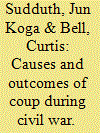

|
|
|
|
|
| Summary/Abstract |
Though approximately one in four coup attempts takes place during an ongoing civil war, scholars have not yet analyzed how the incidence of civil war affects coup attempts and outcomes. We conduct the first empirical analysis of the relationship between ongoing civil war and coup activity, finding (1) war increases the risk of a coup attempt, though (2) war-time coup attempts are significantly less likely to be successful, and (3) the risk of war-time coup is much higher when states face stronger rebel groups that pose greater threats to the political survival of the incumbent government. We attribute these findings to the pernicious effect of ongoing war on the welfare of the military elites and soldiers who have the greatest capacity to execute a coup attempt. As war diminishes their welfare and creates uncertainty about the future of the state, potential plotters become more willing to accept riskier coup attempts than they might plot during peace-time. Coup motivations are greatest when incumbents are more likely to lose their wars, and this causes coup plotters to attempt more and riskier coups when rebels are relatively strong.
|
|
|
|
|
|
|
|
|
|
|
|
|
|
|
|
| 2 |
ID:
174886
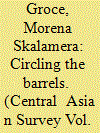

|
|
|
|
|
| Summary/Abstract |
Most of Kazakhstan’s wealth hinges on oil rents, and the overall performance of the economy is closely linked to petroleum’s price fluctuations. This study asks (1) why the institution of private ownership of oil proceeds has not led to a positive transformation of patron–client relations embedded in the country’s energy sector, thus challenging the relevance of the ‘private ownership’ narrative, and (2) why the collapse in the price of oil did not affect the stability and essential character of the regime in power. To answer these questions, the article examines two case studies: the privatization of the oil sector in the 1990s, and the post-2014 oil crisis. Thus the article problematizes important theories on oil-sector privatization and contributes to recent work on regime stability as it pertains to the resource curse. The analysis of the constitutive impact of oil wealth on Kazakh politics generates wider insights on the links between the power of informal networks and regime stability in petrostates through boom and bust cycles.
|
|
|
|
|
|
|
|
|
|
|
|
|
|
|
|
| 3 |
ID:
137758


|
|
|
|
|
| Summary/Abstract |
This article examines the impact of UN-imposed sanctions on the stability of the Eritrean regime, with a focus on the reaction of the diaspora. It explores the transnational nature of Eritrean society and examines the history and structure of the Eritrean diaspora as well as its transformation since the political crisis of 2001. The article demonstrates that the government, as well as both its supporters and its opponents in the diaspora, have all instrumentalized sanctions for their own purposes. The government has used sanctions to rally supporters “around the flag”, calling on the diaspora to raise funds to negate their effect. By contrast, opposition activists have campaigned against the 2 percent “diaspora tax” levied by the government, arguing that it may be used for illicit military purposes in breach of the sanctions regime. In this sense, the sanctions have destabilized a core component of the regime's resource base. However, the failure of the diasporic opposition to organize a joint campaign to persuade host governments to outlaw the collection of the tax has undermined its efforts. Funds raised through the diaspora tax thus continue to flow into government coffers, playing a stabilizing role in spite of the UN sanctions regime.
|
|
|
|
|
|
|
|
|
|
|
|
|
|
|
|
| 4 |
ID:
123401
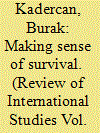

|
|
|
|
|
| Publication |
2013.
|
| Summary/Abstract |
The assumption that 'states' primary goal is survival' lies at the heart of the neorealist paradigm. A careful examination of the assumption, however, reveals that neorealists draw upon a number of distinct interpretations of the 'survival assumption' that are then treated as if they are the same, pointing towards conceptual problems that surround the treatment of state preferences. This article offers a specification that focuses on two questions that highlight the role and function of the survival assumption in the neorealist logic: (i) what do states have to lose if they fail to adopt self-help strategies?; and (ii) how does concern for relevant losses motivate state behaviour and affect international outcomes? Answering these questions through the exploration of governing elites' sensitivity towards regime stability and territorial integrity of the state, in turn, addresses the aforementioned conceptual problems. This specification has further implications for the debates among defensive and offensive realists, potential extensions of the neorealist logic beyond the Westphalian states, and the relationship between neorealist theory and policy analysis.
|
|
|
|
|
|
|
|
|
|
|
|
|
|
|
|
| 5 |
ID:
090371
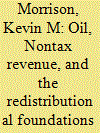

|
|
|
|
|
| Publication |
2009.
|
| Summary/Abstract |
Nontax revenues make up a substantial amount of government revenue around the world, though scholars usually focus on individual sources of such revenue (for example, foreign aid and state-owned oil companies). Using a theory of regime change that builds on recent models of the redistributional foundations of dictatorships and democracies, I generate hypotheses regarding all nontax revenue and regime stability. I argue that an increase in nontax revenue should be associated with less taxation of elites in democracies, more social spending in dictatorships, and more stability for both regime types. I find support for all three of these hypotheses in a cross-sectional time-series analysis, covering all countries and years for which the necessary data are available. Significantly, I show that the particular source of nontax revenue does not make a difference: they all act similarly with regard to regime stability and the causal mechanisms.
|
|
|
|
|
|
|
|
|
|
|
|
|
|
|
|
| 6 |
ID:
121819


|
|
|
|
|
| Publication |
2013.
|
| Summary/Abstract |
Uganda suffered coups between 1966 and 1985, but has remained stable since 1986 despite predisposition to previous coups. Ethnic antagonism, weak state institutionalization, and past coups, had made Uganda coup-prone. Compared to previous governments, the post-1986 leadership effectively applied and undertook coup-prevention strategies consistent with James Quinlivan's coup-proofing theory. These include establishing a parallel military structure to the mainstream military; formation of security services with parallel reporting channels, monitoring over society, and other security agencies; and co-optation of the military in politics through parliamentary representation. These measures have helped the regime to watch over security agencies and prevent possible military intervention. Uganda's post-1986 regime stability is interesting in its own right. But it provides evidence consistent with, and useful for testing the efficacy of, Quinlivan's coup-proofing theory: with relevant application and domestication the theory applies to Uganda.
|
|
|
|
|
|
|
|
|
|
|
|
|
|
|
|
| 7 |
ID:
139478


|
|
|
|
|
| Summary/Abstract |
The Indo-Pakistani rivalry is among the most hostile in the world today. This paper provides a new explanation for why we observe variation in hostility leves in this rivalry.
|
|
|
|
|
|
|
|
|
|
|
|
|
|
|
|
| 8 |
ID:
188645
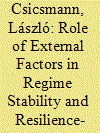

|
|
|
|
|
| Summary/Abstract |
This article aims to bring together the factors of resilience, regime stability, and foreign penetration into one research project based on the example of the Hashemite Kingdom of Jordan, which marked the one-hundredth anniversary of its statehood in 2021. Even though it exists in a neighborhood that is in turmoil, the Jordanian monarchy has managed to survive all the spillover effects from such regional conflicts. This study argues that external influences have played an increasingly significant role in political developments in Jordan since the beginning of the New World Order in 1989. Scholars of international relations often argue that foreign penetration may cause state vacuums like those that have arisen in Syria, Libya, Yemen, and Iraq. Yet, this has not been the case with other states in the Middle East. One important factor behind this resilience and regime stability is related to the behavior of foreign actors. With respect to the Hashemite Kingdom, the United States has historically been the main provider of state security. Nonetheless, at the same time the European Union (EU) has adopted a pragmatic view toward Jordan and its new resilience-building approach also helps to maintain the status quo. Moreover, the regional hegemons and swing states of the Middle East and North Africa (MENA) region do not have an interest in altering the existing order save for a few radical groups. The author argues that the convergence of the national interests of the major regional stakeholders also contributes to regime stability and that outside support has increased the resilience of its political system despite the growing frustrations of many of the country’s citizens.
|
|
|
|
|
|
|
|
|
|
|
|
|
|
|
|
| 9 |
ID:
113864


|
|
|
|
|
| Publication |
2012.
|
| Summary/Abstract |
Following costly military defeats political elites usually attempt to persuade their publics that the battlefield outcome was not a shameful defeat but a 'moral victory'. Yet, only sometimes their public accepts these claims. The paper tries to explain this variation in the domestic publics' perceptions in the cases of non-democratic entities. It is argued that the key variable that determines actors' success in claiming a moral victory is the existence of certain battlefield elements, or at least symbolic military acts/achievements of the defeated actor which can persuade his public that these battlefield elements existed. Propaganda efforts to misrepresent the battlefield facts can play only a secondary role and only under certain conditions.
|
|
|
|
|
|
|
|
|
|
|
|
|
|
|
|
|
|
|
|
|